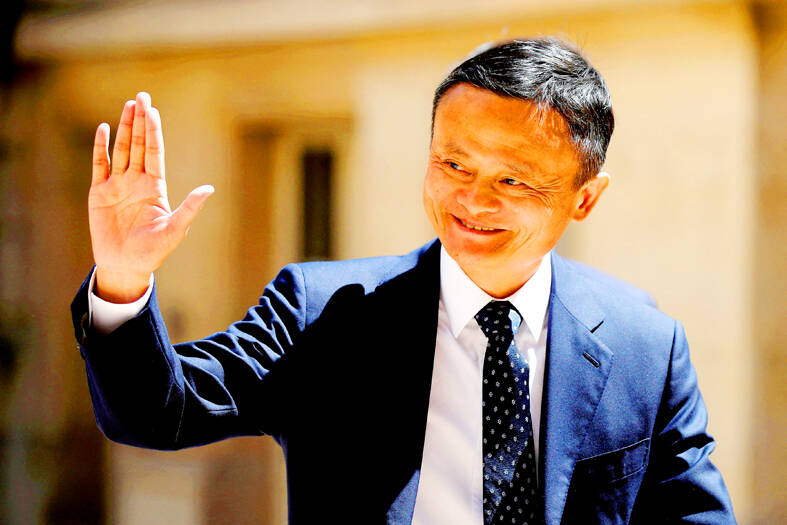Alibaba Group Holding Ltd (阿里巴巴) founder Jack Ma (馬雲) has been living in Tokyo for almost six months after disappearing from public view following China’s crackdown on the tech sector, the Financial Times reported yesterday, citing multiple unnamed sources.
The billionaire has kept a low profile since the crackdown, which has included Chinese regulators scrapping the initial public offering of Ma’s Ant Group Co (螞蟻集團) and issuing Alibaba with record fines.
However, the Times said he has spent much of the past six months with his family in Tokyo and other parts of Japan, along with visits to the US and Israel.

Photo: Reuters
The British newspaper said Ma has frequented several private members’ clubs in Tokyo. He also brought his personal chef and security staff with him and has become an “enthusiastic collector” of Japanese modern art, as well as exploring expanding his business interests to include sustainability, the paper said.
Ma is a close friend of Masayoshi Son, founder of Tokyo-based Softbank Group Corp and an early investor in Alibaba.
Ma has been spotted elsewhere since he effectively disappeared from public view in China, including on the Spanish island of Mallorca last year.
In the past few years, Chinese officials have taken aim at alleged anti-competitive practices by some of the country’s biggest names, driven by fears that major Internet firms control too much data and expanded too quickly.
In July, a report said that Ma planned to hand over control of Ant Group to appease Chinese regulators and revive the digital payments unit’s initial public offering.
His e-commerce giant Alibaba in August reported flat revenue growth for the first time, as China battled an economic slowdown and resurgent COVID-19 cases.
US authorities have put the company on a watchlist that could see it delisted in New York if it does not comply with disclosure orders, causing its shares to slump.

CHIP RACE: Three years of overbroad export controls drove foreign competitors to pursue their own AI chips, and ‘cost US taxpayers billions of dollars,’ Nvidia said China has figured out the US strategy for allowing it to buy Nvidia Corp’s H200s and is rejecting the artificial intelligence (AI) chip in favor of domestically developed semiconductors, White House AI adviser David Sacks said, citing news reports. US President Donald Trump on Monday said that he would allow shipments of Nvidia’s H200 chips to China, part of an administration effort backed by Sacks to challenge Chinese tech champions such as Huawei Technologies Co (華為) by bringing US competition to their home market. On Friday, Sacks signaled that he was uncertain about whether that approach would work. “They’re rejecting our chips,” Sacks

Taiwan’s exports soared 56 percent year-on-year to an all-time high of US$64.05 billion last month, propelled by surging global demand for artificial intelligence (AI), high-performance computing and cloud service infrastructure, the Ministry of Finance said yesterday. Department of Statistics Director-General Beatrice Tsai (蔡美娜) called the figure an unexpected upside surprise, citing a wave of technology orders from overseas customers alongside the usual year-end shopping season for technology products. Growth is likely to remain strong this month, she said, projecting a 40 percent to 45 percent expansion on an annual basis. The outperformance could prompt the Directorate-General of Budget, Accounting and

NATIONAL SECURITY: Intel’s testing of ACM tools despite US government control ‘highlights egregious gaps in US technology protection policies,’ a former official said Chipmaker Intel Corp has tested chipmaking tools this year from a toolmaker with deep roots in China and two overseas units that were targeted by US sanctions, according to two sources with direct knowledge of the matter. Intel, which fended off calls for its CEO’s resignation from US President Donald Trump in August over his alleged ties to China, got the tools from ACM Research Inc, a Fremont, California-based producer of chipmaking equipment. Two of ACM’s units, based in Shanghai and South Korea, were among a number of firms barred last year from receiving US technology over claims they have

BARRIERS: Gudeng’s chairman said it was unlikely that the US could replicate Taiwan’s science parks in Arizona, given its strict immigration policies and cultural differences Gudeng Precision Industrial Co (家登), which supplies wafer pods to the world’s major semiconductor firms, yesterday said it is in no rush to set up production in the US due to high costs. The company supplies its customers through a warehouse in Arizona jointly operated by TSS Holdings Ltd (德鑫控股), a joint holding of Gudeng and 17 Taiwanese firms in the semiconductor supply chain, including specialty plastic compounds producer Nytex Composites Co (耐特) and automated material handling system supplier Symtek Automation Asia Co (迅得). While the company has long been exploring the feasibility of setting up production in the US to address